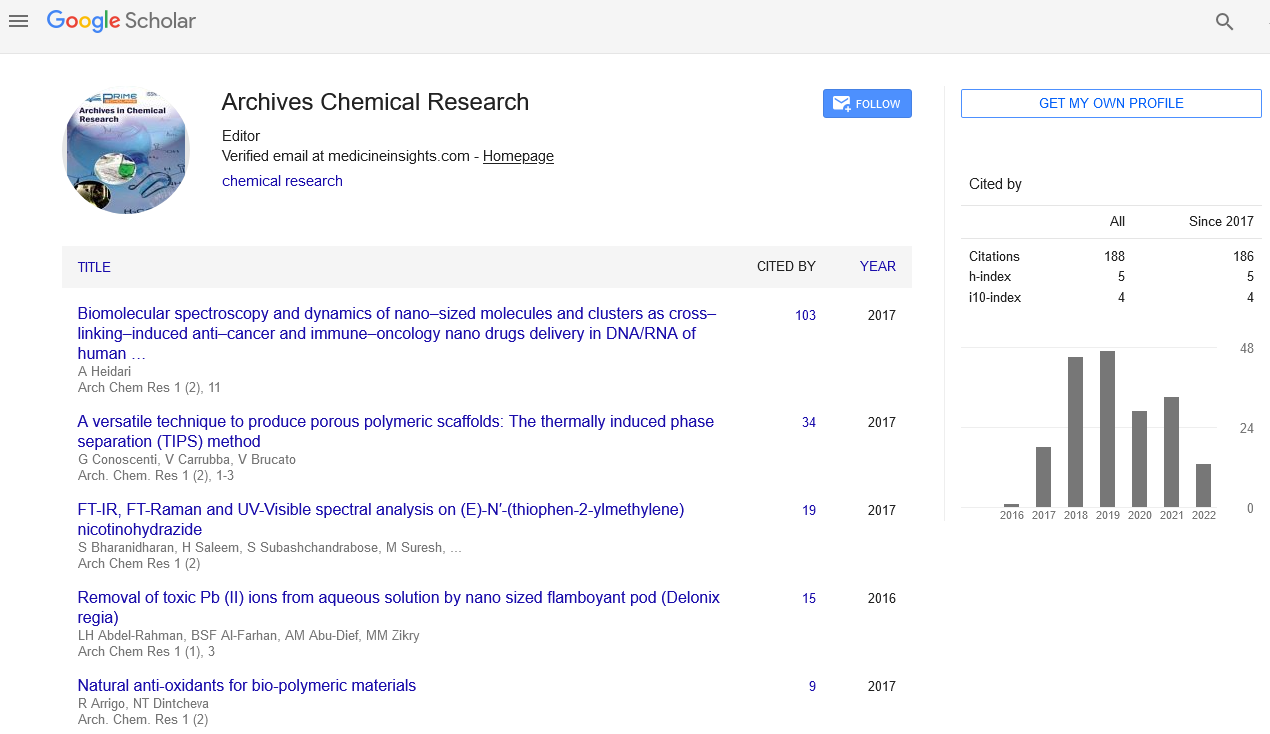Commentary - (2024) Volume 8, Issue 4
Quantum Chemistry: Unlocking the Mysteries of Molecular Behavior
Nana Ito*
Department of Chemical, Kanazawa University, Japan
*Correspondence:
Nana Ito,
Department of Chemical, Kanazawa University,
Japan,
Email:
Received: 02-Dec-2024, Manuscript No. ipacrh-25-22500;
Editor assigned: 04-Dec-2024, Pre QC No. ipacrh-25-22500(PQ);
Reviewed: 18-Dec-2024, QC No. ipacrh-25-22500;
Revised: 23-Dec-2024, Manuscript No. ipacrh-25-22500(R);
Published:
30-Dec-2024, DOI: 10.35841/2572-4657.8.4.22
Description
Quantum chemistry, short for classical chemistry, are
measurable indicators of classical chemistry, conditions,
or diseases. They play a crucial role in modern medicine,
facilitating the diagnosis, prognosis, and monitoring of
diseases, as well as the development of personalized treatment
plans. By providing real time data about the biological state of
a patient, biomarkers offer a powerful tool for enhancing our
understanding of disease mechanisms and improving clinical
outcomes. They can be used in a variety of contexts. They can
provide information about the likely course or outcome of a
disease, helping clinicians predict the progression of a disease
and tailor treatment plans. Biomarkers allow for the tracking
of disease progression or regression, as well as the assessment
of the effectiveness of treatments. They help identify which
patients are most likely to benefit from specific treatments,
allowing for more individualized care. Biomarkers can be
broadly categorized based on their purpose and the biological
material from which they are derived. These quantum
chemistry are used to detect the presence of a disease or
condition. The presence of prostate specific antigen in blood
is a biomarker for prostate cancer. Elevated levels can suggest
prostate cancer though further testing is often required to
confirm the diagnosis. Prognostic quantum chemistry provide
information about the likely course and outcome of a disease.
In breast cancer, the overexpression is associated with a more
aggressive form of the disease. Predictive biomarkers are
used to identify which patients are more likely to respond to
a specific treatment. The gene mutation in colorectal cancer
is a predictive biomarker for response to certain therapies,
such as epidermal growth factor receptor inhibitors. Patients
with a mutation may not benefit from these treatments,
guiding clinicians to alternative therapies. These biomarkers
help assess how a patient body is responding to a particular
treatment. They provide real time feedback on the effects
of a drug, including whether it is reaching its target and
exerting the desired biological effect. Creactive protein is
an inflammatory marker that can be measured to track the
effectiveness of anti inflammatory treatments in conditions
like rheumatoid arthritis. A surrogate endpoint is a biomarker
used as a substitute for a clinical endpoint. These markers are
often used in clinical trials to evaluate the effects of treatments
when direct clinical outcomes are difficult or slow to measure.
Measuring the viral load is often used as a surrogate marker for
disease progression and treatment efficacy, even though clinical
symptoms may take years to manifest. These biomarkers can
guide the choice of treatment options, especially in oncology.
Emerging research is exploring the use of saliva and even
breath samples as sources of biomarkers. These markers are
used in emergency rooms for rapid diagnosis and in chronic
disease management. Technologies such as next generation
sequencing mass spectrometry, and liquid biopsy are
revolutionizing the identification and use of biomarkers. The
quantum chemistry to detect diseases at the molecular level
before symptoms appear, improving the chances of successful
treatment. Despite these advances, challenges remain in the
validation and standardization of quantum chemistry for clinical
use. Biomarkers must undergo rigorous testing to ensure they
are accurate, reproducible, and reliable across diverse patient
populations. As research continues to advance, biomarkers will
play an increasingly central role in improving patient outcomes
and shaping the future of healthcare.
Acknowledgement
None.
Conflict Of Interest
The authors declare no conflict of interest.
Citation: Ito N (2024) Quantum Chemistry: Unlocking the Mysteries of Molecular Behavior. Arch Chem Res. 8:22.
Copyright: © 2024 Ito N. This is an open-access article distributed under the terms of the Creative Commons Attribution License, which permits unrestricted use, distribution, and reproduction in any medium, provided the original author and source are credited.

